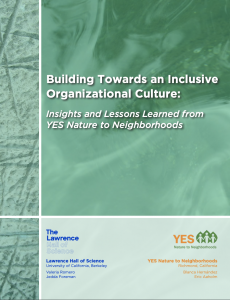What we think of today as the environmental education field has historically lacked racial diversity in its workforce (Taylor, 2014; Johnson, 2019). More recently, organizations have taken great efforts towards change by focusing on increasing racial diversity through recruitment and selection procedures (Romero, et al., 2019). Yet we continue to see evidence that organizations are not thinking beyond recruitment to consider how they enact practices and policies that reify the marginalization and oppression of Black, Indigenous, and People of Color (BIPOC) within organizations (Johnson, 2019; Romero, et al., 2019). This contributes to a work culture and experience wherein BIPOC are more likely to leave their jobs, thus inhibiting efforts towards achieving greater, lasting diversity within organizations and across leadership positions (Brands & Fernandez-Mateo, 2017; Goulden, Mason & Frasch, 2011; Johnson, 2019). This brief highlights YES Nature to Neighborhood’s reflective journey in transforming their organizational culture to intentionally tend to the ways their systems and practices can foster the promotion and retention of BIPOC in the organization.
ACKNOWLEDGMENTS
This brief is the third in our series resulting from a collaborative project, Working Towards Equitable Organizations, that is funded by the Pisces Foundation and the Clarence E. Heller Charitable Foundation, and would not be possible without the contributions of all the partners: Charity Maybury, Christy Rocca, and Francis Taroc of Crissy Field Center at the Golden Gate National Parks Conservancy; José González, founder of Latino Outdoors; Eric Aaholm of YES Nature to Neighborhoods; and Kim Moore Bailey, Laura Rodriguez, and Rena Payan of Youth Outside.
Our first brief, Examining Equitable and Inclusive Organizations in Environmental Education: Perspectives from the Field (Romero, Foreman, Strang, Rodriguez, Payan, and Moore Bailey, 2019), drew our attention to an important consideration: that “many equity, inclusion, and diversity initiatives are primarily focused on external- facing programs; that is, organizations are more likely to be thinking about equity, inclusion, and diversity in regard to learning experiences for learners, as opposed to the organizational work environment” (p. 3). The lack of focus on the organizational work environment marginalizes people of color in the field.
The second brief in this series, Intentional Hiring and Recruitment through the Lens of Equity and Inclusion: Insights and Lessons Learned from Crissy Field Center, Golden Gate National Parks Conservancy (Romero, Foreman, Strang, Maybury, Pepito, & Rocca, 2019), highlighted the organizational journey toward mitigating unconscious bias in their recruitment and hiring practices, as a means towards cultivating a workforce that reflects the youth they serve and their organization-wide core values of equity and inclusion. YES Nature to Neighborhoods is an example of an organization that has been intentionally on a journey to build an inclusive organizational culture. Recognizing this process, we invited Blanca Hernández, YES Program Director, to share this story. The Lawrence Hall of Science offers gratitude to Blanca and the entire YES organization for their time, thoughtfulness, transparency, willingness to share, and critical perspectives throughout the writing of this brief. As well, we thank Laura Rodriguez, Director of Programs at Youth Outside, for her review, advice, and support of this document.
Lead funding for this study was provided by the Pisces Foundation.
Additional funding was provided by the Clarence E. Heller Foundation.
References
Brands, R. A., & Fernandez-Mateo, I. (2017). Leaning Out: How Negative Recruitment Experiences Shape Women’s Decisions to Compete for Executive Roles. Administrative Science Quarterly, 62(3), 405–442.
Goulden, M., Mason, M. A., & Frasch, K. (2011). Keeping women in the science pipeline. Annals of the American Academy of Political and Social Science, 638(1), 141–162.
Romero, V., Foreman, J., Strang, C., Rodriguez, L.,
Payan, R., & Moore Bailey, K. (2019). Examining equitable and inclusive work environments in environmental education: Perspectives from the field and implications for organizations. Berkeley, CA.
Taylor, D. E (2014). The state of diversity in environmental organizations: Mainstream NGOs, foundations, and government agencies. Green 2.0. https://www.diversegreen.org/thechallenge.

